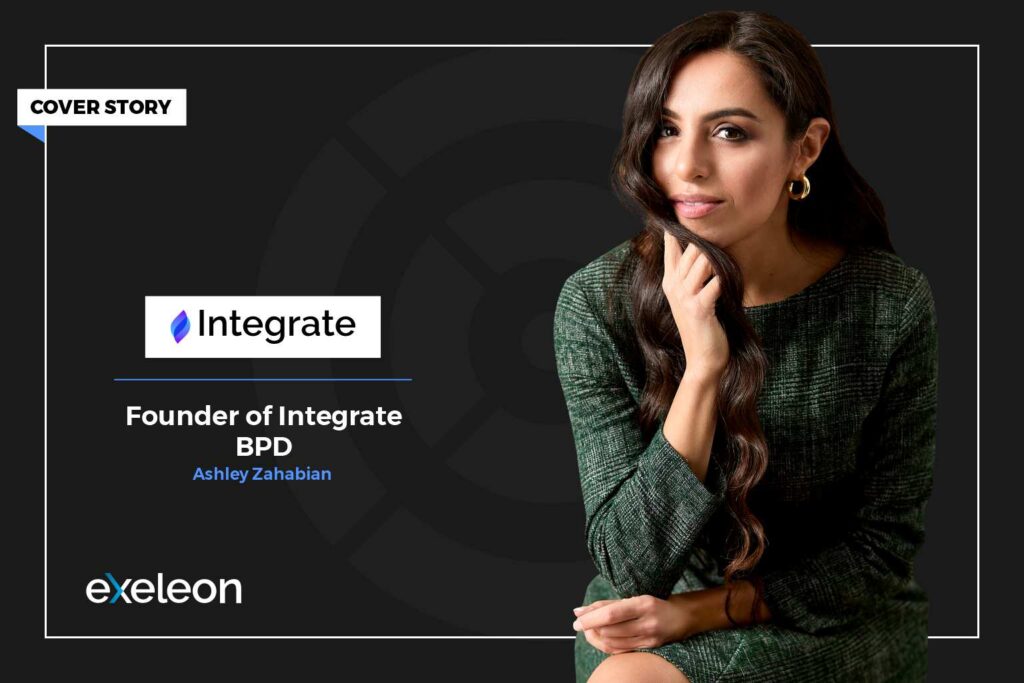
Ashley Zahabian: Breaking Boundaries with IntegrateBPD
Transformational leaders are dynamic individuals who possess a unique blend of strategic foresight, innovative thinking, and the ability to inspire and mobilize their teams toward a shared vision.
These leaders are not content with maintaining the status quo, instead they’re determined to leave a lasting legacy, one that impacts lives and communities.
Ashley Zahabian, Founder of Integrate BPD, is an example of one such transformational leader who has dedicated her career to understanding the impact of emotional intelligence and personality styles to help individuals find effective solutions.
She extends her expertise beyond the clinical setting, working as an empowerment speaker and entrepreneur. Through her work, Ashley helps individuals unlock their potential and achieve success, highlighting her commitment to fostering growth, resilience, and principled thinking.
Fittingly, Ashley features on the Cover of Exeleon Magazine’s Most Transformational CEOs to Follow in 2024 issue.
The Foundation
From a young age, Ashley Zahabian embarked on an entrepreneurial journey that was both challenging and rewarding. At just 17, she founded her first business, a venture that was met with its fair share of trials and errors.
She always connected entrepreneurship with sports: “The younger you begin, the better you’re going to be at it. You must be okay with getting things wrong and falling at first, yet still be willing to show up to practice every single day,” she explains.
One day, that persistence to go on and show up to practice every single day will add up to create a durable product or service – one that people are benefiting from and are willing to pay for.
Throughout her journey, she has made mistakes, faced failures, and has gone through moments where she wanted to throw everything away. She describes these experiences as integral to her growth and her eventual success: “It takes years before you get it right and do it seamlessly… it only takes one performance to change the trajectory of your entire life.”
Ashley also points out that the support of her family played a crucial role in shaping her entrepreneurial spirit while growing up. Contrary to the conventional advice of securing a corporate job, her parents, both entrepreneurs themselves, encouraged her to carve her own path and create something meaningful. “They always believed in my business acumen and pushed me to be different,” she remembers. This support, combined with the core business values instilled by her parents, laid the foundation for her entrepreneurial success.
Integrating Growth
Integrate BPD is a self-analysis platform administered to those suffering from Borderline Personality Disorder (BPD). The platform allows users to obtain the benefits of psychoanalysis in a more consistent, affordable, and effective way.
Current therapies for BPD tend to begin in the present, focusing on symptom management, while the Integrate BPD approach addresses the root cause of the disorder—disordered object relations. Ashley explains, “After this moment is pinpointed, the individual learns how narcissistic trauma in childhood can create a split between reality and fantasy, and how their personality (personal reality) was formed from that split. The individual’s fantasy, however, feels completely real to them; so rather than rejecting it, Integrate BPD encourages them to acknowledge it and then slowly grieve it.”
She continues, “Once a person grieves and let’s go of what they formerly believed to be real, actual reality is integrated. Their personality then roots itself, which alleviates symptoms of the disorder, rendering absolutely no need for symptom management.”
By helping users identify and grieve their split between personal and actual reality, Ashley and Integrate BPD facilitate a deeper and more lasting healing process.
Personal-Reality Disorder
For Ashley, the motivation behind starting Integrate BPD was driven by her own experiences with BPD and the desire to offer others the chance at healing.
Having suffered from BPD for nearly her entire life, Ashley was determined to find a solution that would heal her disorder. She realized that the split between her personal reality and actual reality was causing all her symptoms, thus perpetuating the disorder. This realization allowed her to find the real problem that was causing all those symptoms.
Integrating the same understanding, she started this company. Integrate BPD’s approach begins in the past, focusing on identifying when and how object relations became disordered, and then guiding individuals through the process of grieving and integrating their reality.
The Focused CEO
As the CEO of Integrate BPD, Ashley’s life is characterized by focus and discipline. Her days are filled with a blend of product development, sales and marketing, team management, research, and direct engagement with customers.
According to her, during the early stages of her recent venture, she maintained a more relaxed schedule, prioritizing the creation of the best product without rushing the process. Her days were spent immersed in reading, researching, and writing, either from the comfort of her couch or at a local coffee shop. However, as the company progressed from development to launch, her responsibilities expanded significantly.
Today, Ashley’s routine begins much earlier, with mornings dedicated to physical exercise or a long walk, followed by a healthy breakfast. Her workday includes a blend of product development, sales and marketing, team building, capital allocation, and in-depth research and data analysis. She takes pride in having a hands-on approach, directly engaging with customers to ensure the highest level of service and satisfaction.
Summing up her daily routine and life as an entrepreneur, Ashley mentions “Focused is probably the word I would use to describe what my life is like – it’s very narrowly focused. I know what I want to do, so I confidently say no to everything that isn’t that without second guessing or feeling like I’m missing out on much.”
The Entrepreneurial Reality
Ashley cautions aspiring entrepreneurs about the financial challenges of starting a business.
“Most people want to become an entrepreneur because of the financial upside, but it’s not a good primary reason to become one. I’d say that most people don’t take into consideration that even with the upside, it’s still difficult to save fast,” she points out.
Entrepreneurship, according to Ashley, is not just about financial gains. It’s about being willing to invest a lifetime of effort into creating something useful and impactful. She advises entrepreneurs to understand that the journey is often more costly and time-consuming than anticipated.
“Everything is more expensive than you think, takes longer than you think, and your piece of the pie is always smaller than you think because costs are everywhere, and they’re always rising,” she concludes saying.





